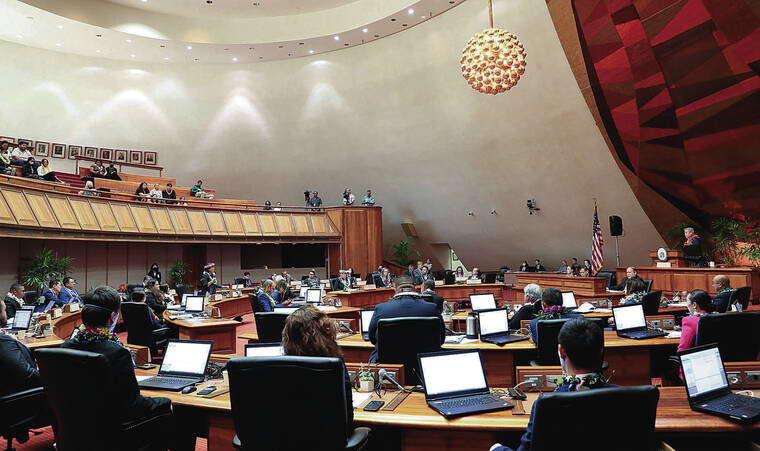
Mahalo for supporting Honolulu Star-Advertiser. Enjoy this free story!
Hawaii lawmakers touted accomplishments in passing more than 200 bills while criticizing a state budget that faced a surprising amount of opposition from both new and veteran House members on the final day of the legislative session Thursday.
The fairly festive last day of business for the 32nd Legislature in separate Senate and House chambers at the state Capitol was peppered with complaints over the budget in the 51-
member House, where six Democrats and two Republicans voted against it and another eight voted for it with reservations — or “serious reservations” in the case of Rep. Justin Woodson (D, Kahului-Puunene), who chairs the House Education Committee.
Most of the complaints focused on the plan to give the state Department of Education $65 million less than what Gov. Josh Green had requested, along with millions less for the University of Hawaii at the same time that the budget calls for adding $500 million to the state’s rainy day fund over each of the next two fiscal years for a total of surplus of nearly $2 billion.
State Rep. Jeannee Kapela (D, Volcano-Hawaiian Ocean View) called the funding priorities “immoral.”
Unhappy House members also complained that the last-minute effort to craft a budget lacked transparency, and even House members serving on the joint House-Senate conference committee to reach compromise did not fully understand what they were voting for.
“This is not work that I feel I can be proud of,” said Rep. Amy Perruso (D, Wahiawa-Whitmore Village-Mokuleia), chair of the House Higher Education and Technology Committee.
Veteran Rep. Della Au Belatti (D, Makiki-Punchbowl) said her no vote Thursday marked the first time she had opposed a state budget in a decade.
The new budget, she said, made “me sick to my stomach.”
Both the House and Senate ultimately voted to send the budget to Green, but the specifics are not expected to become public for weeks.
At the same time, the compromise reached in the conference committee gives Green wide latitude to find money to provide more funding for the DOE, UH and even the Hawaii Tourism Authority, which was left in limbo at the end of the session, said Rep. Kyle Yamashita, chair of the House Finance Committee.
In the Senate the vote on the budget measure, House Bill 300, was 25-0, with no divisive discussion.
Sen. Donovan Dela Cruz, chair of the finance-focused Ways and Means Committee, told fellow senators that the budget bill enrolled to Green “answers the call to address myriad persistent and challenging issues for the state.”
Dela Cruz (D, Mililani-
Wahiawa-Whitmore Village) highlighted some of the many issues to receive funding under the bill over two fiscal years, including $380 million for affordable-
housing development, early childhood classroom development, climate change mitigation, infrastructure maintenance and $1 billion for the rainy day fund.
After the Senate floor session adjourned, Sen. Michelle Kidani, chair of the Senate Committee on Education, said she does not believe that Hawaii’s public school system, including the University of Hawaii, received funding cuts.
“I think the public schools were actually big winners,” said Kidani (D, Mililani Town-Waipio Gentry-Royal Kunia).
For the second year in a row, the Legislature had more projected revenue to appropriate than the prior two years, when Hawaii’s economy was hobbled during the COVID-19 pandemic.
HB 300 appropriates $11.3 billion in fiscal year 2024 and $10.4 billion in fiscal year 2025 from general funds for operations not including capital improvement project funding.
Sen. President Ron Kouchi (D, Kauai-Niihau) noted that this year’s session involved a new governor, six new Senate members and 18 new House members along with considerable new leadership roles that provided some challenges after a dozen lawmakers with 90 years’ worth of legislative experience retired in 2022.
Along with a new administration, new members and new committee chairs, Yamashita said the budget process began slowly with a new governor and new legislative leadership.
He told reporters there will be a budget in place and that Green is expected to propose a new budget well ahead of the 2024 legislative session.
Many good bills were passed, Kouchi said. And some that Kouchi wished had passed failed because of what he said were differences between new members in the House and Senate.
“I look at it as a first step in building a better relationship and having a better understanding so that we can come back and be more successful next year,” he said.
Green praised lawmakers for embracing some objectives he laid out in his State of the State address in January, and thanked them for tireless work on issues that included tax relief, the need for more affordable housing, better health care and environmental protections.
Among some of the higher-
profile bills sent to the governor are measures that would provide lower-income Hawaii households with $125 million in tax credits, ensure abortion protections in Hawaii, forgive education loans for certain high-demand health care workers and help homeless people from other states return to family and relatives in their home state.
The Legislature stiffed the Hawaii Tourism Authority of funding for the next two fiscal years after not deciding to abolish the agency that markets Hawaii and is in charge of destination management.
On Thursday, Sens. Gilbert Keith-Agaran (D, Wailuku-Kahului-Waihee) and Lynn DeCoite (D, East and Upcountry Maui-
Molokai-Lanai) and said $30 million in federal coronavirus aid and $30 million in state money could be used to fund agency operations.
HTA had requested $75 million for operations for the next fiscal year.
Another big issue for the Legislature this year was to prevent misdeeds by members and improve public confidence in their work with new ethics rules and other changes.
The work stemmed from the Commission to Improve Standards of Conduct established by the House in 2022 in connection with convictions in 2022 of former Senate Majority Leader J. Kalani English and the former vice chair of the House Finance Committee, former Rep. Ty J.K. Cullen, on charges they accepted bribes from a local businessman in exchange for action on legislation.
Reform bills that were passed restrict lobbyist gifts, prohibit legal lobbyist contributions to elected officials during legislative sessions, require state lawmakers to disclose relationships with lobbyists, and require lobbyists to identify legislative or administrative actions where they have taken a position. Bills to increase criminal penalties for certain violations also were passed, among other things.
Not every recommendation by the commission was passed, including one for term limits in the Legislature and one to make nepotism in the Legislature illegal. But overall, lawmakers adopted many of the commission recommendations.
”This was a banner year for ethics, for campaign spending, for making the penalties tougher for those who would do what a couple of our colleagues did a couple years ago,” Karl Rhoads (D, Nuuanu-Downtown-
Iwilei) said after the Senate floor session.
House Speaker Scott Saiki and Rep. David Tarnas, chair of the House Judiciary and Hawaiian Affairs Committee, said the nepotism prohibition is covered by Senate and House rules.
Of the 33 recommendations from the Commission to Improve Standards of Conduct, Tarnas said that 20 were “addressed fully by the Legislature through bills that we passed; two were partially addressed. Of the 11 that did not pass out of the Legislature as a whole, six of them were passed by the House and Senate, but they died in conference committee. And one of the bills was not approved by the House — that’s the term limits bill.”
Of more than 200 bills approved, about 75 received final votes in the House and Senate last week along with the budget bill, which was the product of a more challenging process this year than in recent years in part due to efforts among House and Senate negotiators to agree on a final draft.
Sen. Kurt Fevella (R, Ewa Beach-Ocean Pointe-
Iroquois Point) said the budget process this year for him as a Ways and Means Committee member was the most difficult in the five years he has served in the Legislature and required extraordinarily hard work.
Kouchi noted that Ways and Means Committee staff had worked to nearly 2 a.m. Saturday detailing budget bill items.
Green vetoed one bill having to do with condominium developer construction defect obligations to condo buyers. But it was overridden Thursday by both the House and Senate.
He now has 45 days to notify the Legislature whether he might veto additional bills.
Read More: World News | Entertainment News | Celeb News
Star Ads




